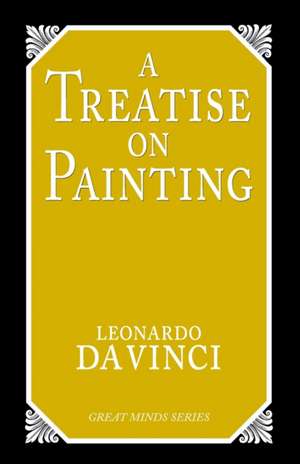A Treatise on Painting: A Child's Story of Loss: Great Minds
Autor Leonardo Da Vinci, John William Brown Ilustrat de Nicholas Poussinen Limba Engleză Paperback – 31 ian 2002
Even a quick perusal of this multifaceted work will reveal the great artist's famously keen powers of observation and his scientific approach to the study of nature. He begins with careful instructions on drawing the main features of human anatomy, then moves on to techniques of rendering motion and perspective. He discusses aspects of good composition; inventiveness; the expression of various emotions; creating effects of light, shadow, and color; and many other subtle points of artistic composition. Throughout Leonardo stresses the importance of meticulous study of the subjects to be rendered and the need for assiduous practice: "Those who become enamored of the practice of the art without having previously applied to the diligent study of the scientific part of it may be compared to mariners who put to sea in a ship without rudder or compass, and therefore cannot be certain of arriving at the wished-for port."
This outstanding edition - complete with anatomical drawings by the French classicist master Nicholas Poussin (1594-1665) and geometrical illustrations by the great Italian Renaissance architect Leon Battista Alberti (1404-1472), as well as an informative life of Leonardo and an appendix that lists the artist's manuscripts, principal paintings, and drawings - will make an attractive addition to the libraries of art students, art historians, and anyone interested in the works of the original "Renaissance man"
Preț: 129.62 lei
Nou
24.80€ • 25.90$ • 20.48£
Carte disponibilă
Livrare economică 25 martie-08 aprilie
Specificații
ISBN-10: 1573929506
Pagini: 364
Ilustrații: Illus
Dimensiuni: 139 x 214 x 19 mm
Greutate: 0.4 kg
Editura: Prometheus Books
Seriile Great Minds, Great Minds Paperback Series
Notă biografică
Translated by John Francis Rigaud, illustrated by Nicholas Poussin with a life of Leonardo and an account of his works by John William Brown
Descriere
The much overused word genius aptly describes only a few people in the history of civilization. Leonardo da Vinci (1452-1519) unquestionably belongs in this elite group. Anyone who has looked in amazement at the Mona Lisa, The Last Supper, or the many drawings that sprang from his fertile imagination may wonder how he accomplished these astounding works of art. Fortunately for posterity, Leonardo left his Treatise on Painting, essentially a primer for students interested in learning the craft of drawing and painting.
Even a quick perusal of this multifaceted work will reveal the great artist's famously keen powers of observation and his scientific approach to the study of nature. He begins with careful instructions on drawing the main features of human anatomy, then moves on to techniques of rendering motion and perspective. He discusses aspects of good composition; inventiveness; the expression of various emotions; creating effects of light, shadow, and color; and many other subtle points of artistic composition. Throughout Leonardo stresses the importance of meticulous study of the subjects to be rendered and the need for assiduous practice: "Those who become enamored of the practice of the art without having previously applied to the diligent study of the scientific part of it may be compared to mariners who put to sea in a ship without rudder or compass, and therefore cannot be certain of arriving at the wished-for port."
This outstanding edition - complete with anatomical drawings by the French classicist master Nicholas Poussin (1594-1665) and geometrical illustrations by the great Italian Renaissance architect Leon Battista Alberti (1404-1472), as well as an informative life of Leonardo and an appendix that lists the artist's manuscripts, principal paintings, and drawings - will make an attractive addition to the libraries of art students, art historians, and anyone interested in the works of the original "Renaissance man"




















